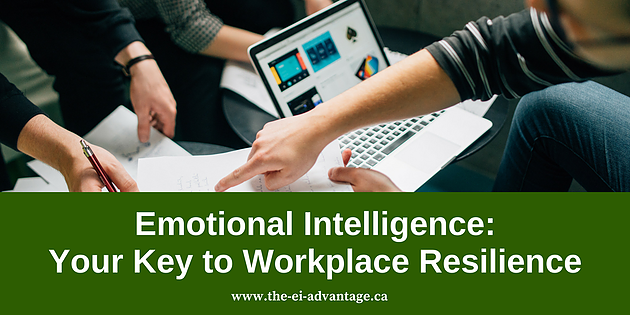Blog
Emotional Intelligence: Your Key to Workplace Resilience
December 07, 2017

Often, we discuss the significance of emotional intelligence in the workplace from a specific perspective, such as how HR leaders can use EI to find the perfect job candidates. However, emotional intelligence is important from many different aspects. For example, EI influences your ability to handle professional challenges and everyday stresses. The modern workplace can be a busy, fast-paced environment; being aware of how to leverage your EI skills will help you be more resilient, and remain optimistic in the face of challenges.
Amplify your resilience, have your team model your behaviour and everyone will enjoy greater job satisfaction.
Embrace the following strategies:
Pair Self-Awareness with Awareness for Others
Self-awareness is the conscious recognition of your thoughts, feelings, motives, and perception of reality. When you become more self-aware of your actions within the workplace, you’re ultimately taking control of your emotions and how you interact with others.
By pairing self-awareness with an awareness of the emotions and motives of others, it’s easier to find resolutions to problems and understand why they occur in the first place. When you’re compassionate of other people’s needs, values, and views, you gain an understanding of why people make the decisions they do, assisting you in recognizing the appropriate way to react.
Through regular introspection into your own emotions and needs, you can reflect on how you best effectively manage these emotions and in turn avoid quick reactions in difficult situations. Perhaps when you’re stressed, you ease your worries by taking a quick 10-minute walk. Maybe you find that turning off email notifications helps you focus and not feel overwhelmed. Regardless of how you cope with your own stress, you can begin to empathize with coworkers who are facing their own professional challenges.
Build New Habits by Practicing Mindfulness
Being mindful of your actions, no matter how small, helps you become a more engaged, efficient, and productive employee. Practicing mindfulness might even help you develop work-related habits that amplify your productivity and creativity.
Healthy professional habits might include changing your occupational tendencies to create a less stressful workday, such as addressing difficult work in the morning to ease into your afternoon. But mindful habits can also help you feel better overall, like ensuring that you’ve always got a full cup of water within reach, setting an alarm to stand once every hour, or making a point to regularly ask your coworkers how they’re doing.
Communicate Effectively With EI
Mastering the art of communication can not only help you become more self-aware of your emotions and tendencies, but it can help you become more empathetic and compassionate over time. By mindfully embracing and practicing communication skills such as active listening, others leave conversations feeling understood and more likely to return to you for professional advice and insights in the future. This helps create a spider-web effect, sparking more efficient communication throughout your workplace.
When we lack resiliency negativity emerges and we become “stuck”. Leveraging your EI to boost resilience to professional stress and challenges takes mindfulness and regular practice. Much mindfulness in the workplace comes down to asking yourself “why” you find certain events stressful, or specific comments frustrating. Working through the “why” behind your reactions and being aware of your emotional skills can help you to create healthier habits and routines that reduce your stress and better suit your personal and professional needs.
In any professional environment, it’s vital to understand how your emotional intelligence and habits have a greater effect on your coworkers and workplace. Get in touch today on Facebook, LinkedIn, or Twitter to find out more about our upcoming EI training sessions, or how you can book your next EI training session for your organization.
